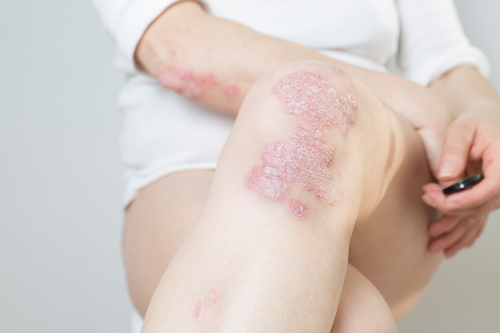
Is psoriasis genetically transferred? Are there any gene therapy treatments?
June 12, 2009

- Related Topics:
- Autoimmune disease,
- Gene therapy,
- Futuristic science
A curious adult from California asks:
"Is psoriasis genetically transferred? From which parent? Are there any modern gene therapy treatments?"
Psoriasis is a disease where people get red lesions on their skin. Around 30% of people with psoriasis have a parent or sibling with the disease too. Which means that it is probably genetically transferred.
But it is not a simple genetic disease. It doesn't appear that either mom or dad is more likely to pass the disease to their kids. And genes aren't enough -- the environment plays an important role too.
To complicate things even further, it looks like more than one gene is involved. This is one of the big reasons why gene therapy is unlikely to cure psoriasis any time soon.
To understand all of this, we need to go into more detail about how scientists figure out if something is genetic or not. Then we'll go over what genes are and how they are involved. From there we'll be able to show that gene therapy is very unlikely to provide a cure.

Twin Studies Show Psoriasis is Partly Genetic
The strongest evidence that genes are involved comes from twin studies. In these studies, scientists compare each twin in identical and fraternal twin pairs.
Identical twins share the exact same DNA. Fraternal twins only share as much DNA as any two siblings.
If both identical twins in a pair always end up with a disease, then that disease is probably due completely to their genes. Diseases like cystic fibrosis fit pretty well into this category.
But if neither type of twin is more likely to share the disease, then it is mostly caused by the environment. Colds or the plague fall into this group.
Psoriasis doesn't fit neatly with either type of disease. Identical twins share psoriasis more often than fraternal twins, but if one identical twin has it, it’s not a guarantee that the other will too. This tells us that psoriasis is at least partly due to genes.
Scientists are hard at work trying to find these genes in people's DNA. And they are starting to make some progress.

Genes and Psoriasis
You can think of DNA like the instruction book for building a new you. And genes are like the chapters in that book that have specific instructions.
So you have some chapters controlling the color of your eyes. And others controlling the color of your hair. And lots of other chapters that affect other things about you. Including your chances for developing psoriasis.
Your genes are actually packaged in units called "chromosomes." These are like separate books in a collection.
Humans have 46 of these chromosomes. Each has many genes, from as few as 70 or 80 on the Y chromosome to more than 4000 on chromosome 1.
So far, scientists have found that at least nine different parts of seven separate chromosomes may influence psoriasis. These regions are pretty big and have lots of genes. This makes finding the specific ones involved in psoriasis very difficult.
However, scientists have managed to find a few. These genes belong to a family called interleukins. Interleukins play an important role in our immune system.
Our immune system helps keep us well by fighting off foreign invaders like bacteria and viruses. An important part of this fight is cells telling each other that there is an invader and where it is. Interleukins are used in this communication.
Scientists have found that these interleukin genes are turned on way too high in the skin of people with psoriasis. This is more evidence that these genes are involved.
But why would interleukins be involved in a skin disease like psoriasis? Because it is an autoimmune disease.
Psoriasis Is Caused By Your Immune System Attacking You
As I said before, your immune system is normally supposed to fight off infections. It does this by attacking anything different from itself. And it usually does a pretty good job.
But sometimes your immune cells can't tell a part of you from an invading bacterium. And so it attacks you. This is what “autoimmune” means.
And this can definitely cause serious problems. Problems like diabetes, lupus, arthritis, and psoriasis.
Remember that in psoriasis your interleukin genes are too activated in your skin. This makes your immune system think you're always being infected there. So your immune cells start attacking your skin cells causing red, sometimes itchy patches.
OK, so we have found some genes that aren't working right in people with PS. We can just go in and fix them with gene therapy, right? Not so fast.

Currently, there are no approved gene therapies. And a cure like this for psoriasis is unlikely. Via Wikimedia
Psoriasis and Gene Therapy
Gene therapy is a technique used to replace broken genes with working ones. Right now, there are no gene therapies approved for use in the United States.
But there are at least two reasons why we probably can't fix psoriasis with gene therapy even when it starts to be used to cure other diseases. The first is that gene therapy is usually used to fix a gene that isn't working at all. In people with psoriasis, the genes still work; they are just turned on too high. It is much more difficult to turn off a gene than to replace one that doesn't work at all.
The other reason is that there are likely many genes involved. Even if scientists could figure out all the genes involved, it would be nearly impossible to fix them all at once.
So scientists should probably concentrate on other treatments. And they are.
There are many options available right now for treating psoriasis. There are ointments you put on your skin and medicines used as a pill or injection. Many of these are meant to slow down your immune system. The idea is that a weakened immune system won't attack your skin so fiercely. Which should lead to less severe symptoms.
Not all these treatments work on all people and doctors have to figure out what works by trial and error. Hopefully, by finding the genes involved with psoriasis, scientists will be able to come up with better medicines. Or at least figure out which ones will work for which patients without simply guessing.
Read More:
- More on disease genetics
- Cancer (multi-gene disease) and gene therapy
- University of Michigan: Study on Familial Psoriasis

Author: Mark McElwain
When this answer was published in 2009, Mark was a Ph.D. candidate in the Department of Developmental Biology, studying WNT signalling in drosophila embryonic patterning in Roel Nusse’s laboratory. Mark wrote this answer while participating in the Stanford at The Tech program.
 Skip Navigation
Skip Navigation
